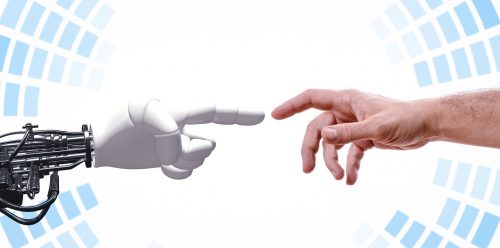Have you ever felt frustrated while sitting in front of your computer, insulting it in rage? Now imagine your computer talking back. Which language would it use to make you hear its disgruntlement loud and clear?
The exchange between the human world and the machine-universe proves to be difficult since there is no lingua franca. To a machine, a tax assessment notice is all zeroes and ones. To a machine, a Shakespearean sonnet is also only zeroes and ones. Imagine an artfully composed poem by the great bard from a computer’s point of view. It would be rendered down into an enormous amount of numbers. How likely are you to enjoy reading a poem written by a computer? How likely are you to even recognise wonderfully woven words behind the extensive rows of numbers?
As long as machines communicate with each other, we benefit from their ability to turn any subject matter into abstract symbols. Large amounts of data can be exchanged and processed in split seconds. However, once real people enter the communication chain, we need to translate complex figures into useful information.
More than words can tell: the emotional side of communication
Let’s go back to Shakespeare for a moment. Imagine one of his artworks stripped down to bare information – young people falling in love, some quarrel, everyone dead in the end. A rather dull reading. Transforming symbols into legible information is not enough. A proper, human conversation should fulfil more than the pure distribution of information. It should be interesting, inspiring, or at least make us feel we are being seen and heard for who we are – each of us individually unique.
It lies in our human nature to cherish individuality. Our capacity to distinguish ourselves from others marks a huge step in our cognitive development in early childhood. We wish to assert our individuality rather than have it undermined by a machine that considers us merely another user. This comes especially into play when problems need to be solved. Who would you rather find a solution with, a benevolent friend or a generic chatbot?
Errors are human
“An unexpected error has occured”: This all too familiar error message offers a little more than just an increase in frustation. While we have a tolerance for human errors, the question is whether we can transfer this patience to machine-made errors. “I’m sorry, it’s too dark and I was not able to recognise your face. Please switch on the light and smile at me so I can help you log in.” An apology with a transparent explanation and a solution appeases us. A machine that does not leave us alone with our problems and makes us feel supported is still a machine, but a relatable one.

Forming a personal bond with a machine may occur in the case of some cars or treasured helpers. What about a software application? Can we bond with a banking that has a name? It’s one of the most basic desires of humans to surround ourselves with familar voices. We need a common language in order to turn the abstract and binary world of machines into a comfortable virtual environment. Language learning can be a tedious task, so why don’t we assign it to the computers we use? If machines speak human, users do not have to speak machine. Fair enough since after all, we created machines to make our lives easier and more pleasant not vice versa.
What would Shakespeare do?
If Shakespeare had written a communication 101 for machines – what would he have recommended? Lesson one: Speaking the human language is more than turning code into a language readable by anyone not only tech-savvy people. It’s also about turning facts and figures into a kind of information that can be grasped at first glance. Lesson two: Speaking human means letting words really speak. It means a commitment to emotion, linguistic richness, and entertaining words. This is the key to turning the virtual engagement of machine and human from information exchange to a trust-building conversation.
A language that ensures a satisfying exchange between human and machine does not appear by itself. This is where copywriters come into play. They lend their linguistic talent to computers and carve out the kind of human language the computer should speak. Copywriters turn the computer’s voice into a familiar one which rather sounds like a kind friend than a generic chatbot. They transform information exchange into a conversation freed of all barriers.


